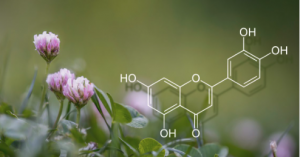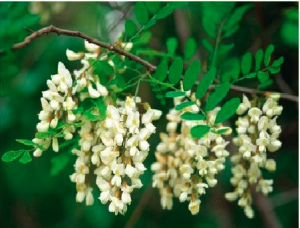By Gabi Giacomin, Dr. of Naturopathic Medicine, Member Trisomy21 Research Foundation, SAC
Published February 16, 2023 on The Conscious Pod. Post dates in this section are adjusted to make them appear in numerical order.
Nutrivene Daily supplement has been reformulated to include Luteolin and Rutin; two powerful bioflavonoids added to the TNI Protocol for neuroprotective benefits. The Powder form of Nutrivene Daily should be selected when using the TNI Calculator for accurate dosing.
Overview of Lesson 14:
In Lesson 14 we learned that having a third copy of chromosome 21 upregulates specific gene proteins which activate neuroinflammation; interleukins, Cox2, APP, etc
Dixie discussed the role of Luteolin and Rutin, two phytonutrients we use to inhibit neuro-inflammation (inflammation in the brain). This is important for people with Down Syndrome (DS) who experience symptoms of neuro-inflammation such as “fogginess, listlessness, agitation, stimming behaviors, sluggish gross and fine motor activities, increased sensory sensitivity, inability to connect with others or surroundings, a loss of limbic function resulting in irrational emotional disturbances including the absence of empathy, also know as mind blindness and seizure activity.” Neuroinflammation is consdiered to be a hallmark of autism 4, with an increasing prevalence in DS.
Recent studies looking at the effectiveness of Luteolin/ Rutin during SARS-Covid 19 revealed outstanding anti-inflammatory activity, particularly in higher doses. For that reason, it became more cost effective to add them to the Daily Supplement.
Looking closely at Neuroinflammation in T21:
Studies indicate that having a third copy of chromosome 21 accelerates the development of Alzheimer’s disease (AD), due to the overepression of plaque forming genes APP, BACE2 and their proteins 1, 2. Plaque formation, observed in children as young as 8 years of age with DS, activates inflammation by attracting brain immune cells (microglia) which secrete inflammatory chemicals.1, 3
Immune cells are activated in repair and recovery of damaged brain tissue. When their activity is excessive or sustained, inflammation becomes chronic leading to neurodegenerative disorders such as AD, Parkinsons, ALS, MS etc. 7. Anti-inflammatory drugs reduce neuroinflammation but don’t directly target immune cytokine (inflammatory chemical) activation. Luteolin specifically inhibits inflammation produced by immune cells in the brain by blocking their inflammatory byproducts. 7
Luteolin
Luteolin’s actions are anti-inflammatory, anti-allergy, anti-tumor, antibacterial and antiviral 6. In studies it lowers inflammatory chemicals (TNFa, IL-1, IL-6, MDA), increases antioxidant availability, and reduces immune activation in the hippocampus and frontal cortex, improving learning and short term memory. 6. Luteolin also protects the Blood Brain Barrier from damage, by reducing inflammation in the brain 9.
Due to its antiinflammatory activity Luteolin is now recognised as providing benefits for skin aging, skin cancer, wound healing and inflammatory skin diseases such as psoriasis, contact and atopic dermatitis. 10
Luteolin is being studied in relation to its benefits for cancer 11, chronic fatigue, mast cell disease and brain fog associated with these and long Covid syndrome 12 Luteolin is well established as an effective natural treatment for cognitive decline associated with AD, Parkinson’s disease, MS and traumatic brain injury 13.
SARS-CoV2 stimulates mast cell activation, which secrete ACE2 and cause bronchoconstriction. 14 The use of NSAIDS were found to aggravate pulmonary symptoms 14. Immune supressants, such as corticosteroids, were not recommended due to a strong immune system needed to fight the viral infection 14.
Luteolin with its broad antiviral activity, was found to specifically bind to the spike protein inhibiting entry into the cells, inhibiting proteases and reducing viral infectivity. 14 Luteolin inhibits mast cells and the inflammatory molecules they secrete 14. Luteolin was ranked the best potential inhibitor of Covid-19 via high-throughput screening by a super computer. 14
Rutin
Recent studies indicate that Rutin is a powerful antioxidant which protects the brain from oxidative stress 5. By inhibiting powerful inflammatory chemicals (Cox-2, IL-8, NFKb) Rutin prevented plaque formation, damage to the hippocampus and maintained levels of brain glutathione proving its effectiveness in the treatment of AD. 5 ,16, 19
Rutin protects the heart from damage by environmental pollutants such as pthalates and BPA, by reducing oxidative stress and inflammation and increasing cellular glutathione 17. Via the same mechanism, Rutin reduces metabolic diseases such as obesity, hypertension, high cholesterol, insulin resistance which contribute to type 2 diabetes, Nonalcoholic fatty liver disease and cardiovascualr disease 18.
In addition, Rutin is an inhibitor of the main protease produced by SARS-CoV-2, an important driver of viral pathogenesis,15
In Summary, the whole TNI protocol is designed to reduce neuroinflammation, with emerging studies holding great promise. Its also recommended to avoid environmental, dietary and metabolic factors that contribute to inflammation in the brain, thus enhancing the effectiveness of these phytonutrients.
References:
1. Down’s syndrome, neuroinflammation, and Alzheimer neuropathogenesis
2. Down syndrome individuals with Alzheimer’s disease have a distinct neuroinflammatory phenotype compared to sporadic Alzheimer’s disease
3. Neuroinflammation in the Aging Down Syndrome Brain; Lessons from Alzheimer’s Disease
4. Neuroinflammation in autism spectrum disorders
5. Rutin prevents cognitive impairments by ameliorating oxidative stress and neuroinflammation in rat model of sporadic dementia of Alzheimer type
6. Luteolin Could Improve Cognitive Dysfunction by Inhibiting Neuroinflammation
7. Luteolin triggers global changes in the microglial transcriptome leading to a unique anti-inflammatory and neuroprotective phenotype
8. Focal brain inflammation and autism
9. Luteolin Inhibits Fibrillary β-Amyloid1–40-Induced Inflammation in a Human Blood-Brain Barrier Model by Suppressing the p38 MAPK-Mediated NF-κB Signaling Pathways
10. Luteolin as a modulator of skin aging and inflammation
11. Luteolin, inflammation and cancer: Special emphasis on gut microbiota
12. Long‐COVID syndrome‐associated brain fog and chemofog: Luteolin to the rescue
13. Neuroprotective effects of flavone luteolin in neuroinflammation and neurotrauma
14. COVID‐19, pulmonary mast cells, cytokine storms, and beneficial actions of luteolin
15. Identification of Berbamine, Oxyacanthine and Rutin from Berberis asiatica as anti-SARS-CoV-2 compounds: An in silico study
16. Rutin ameliorates copper sulfate-induced brain damage via antioxidative and anti-inflammatory activities in rats
17. Rutin prevents cardiac oxidative stress and inflammation induced by bisphenol A and dibutyl phthalate exposure via NRF-2/NF-κB pathway
18. Rutin ameliorates inflammation and improves metabolic function: A comprehensive analysis of scientific literature
19. Rutin prevents tau pathology and neuroinflammation in a mouse model of Alzheimer’s disease
 English
English Español de México
Español de México Português
Português Français
Français


Read.